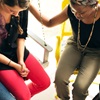Building solid relationships within a small group is easier if you understand the stages a typical group moves through as members connect with one another. While each group is unique, there is a common journey that most small groups experience. And if you want to work through the barriers of relational connections in your small group, you have to first understand the stages of group life.
Relationships flow through a continuum. Let me illustrate. If you are married, on your first date say to your spouse to be, "I love you and want to marry you?" No, you didn't do that. You let the relationship develop, and as it developed the conversation and relationship intensified. It's the same with a small group.
Building the relationships in your group is not rocket science. (In fact my sister is an aerospace engineer for Boeing, which technically makes her a rocket scientist. We've talked about small groups and she insists that they are most definitely not rocket science!)
The Meeting Stage
When your group first starts out, it is in the Meeting Stage. At this stage your responsibilities are to call a meeting to order. You should have three concerns during this stage:
- Are people coming? If they don't come, you don't have a group.
- Do they come regularly? If they are hit or miss, they don't understand what the group is all about or haven't considered the commitment required.
- When people come, do they participate?
If you answered no to any of those questions, you are likely in the Meeting Stage of the connecting continuum.
If, during this first phase, you over-challenge your people or get upset at them for lack of commitment, you will tank your group. I remember telling a girl in college that I loved her. When she asked me if I intended to marry her, I wondered if I should break up with her right there on that park bench or later that evening. I chose the second option. She was real nice, but the timing was very bad! The point is: you shouldn't expect too much too soon.
The Committing Stage
The second stage of the connecting continuum is the Committing Stage. At this stage your responsibility as a leader is to create a friendly environment. Again, there are three questions of this stage to look out for:
- Are group members interested in each other's lives? Are they interested in knowing more about their work, families, and hobbies?
- Are members sharing raw, honest, and heartfelt thoughts? If people are committing to the group, they will share what they really think—not just what they think the other people in the group want to hear.
- Do people hang out after group time? When the official group time has ended, do they sit around and talk longer?
While you can't force people to commit to one another, you can create a safe, friendly environment that they want to spend time in. This does mean you need to give permission to your group to share what they really think and not just safe, "church answers."
The Belonging Stage
The third stage of a group is what I call the Belonging Stage. During this stage, your job as the group leader is to remove yourself as the hub and celebrate the reality that the group belongs to the group—not to you. Three more questions:
- Do members of the group hang out together outside of the group? In other words, the formal meeting should become less important than the relationships that form.
- Do you know the life-stories of everyone in the group? I don't mean testimonies, but the full story of your group members. I can honestly say that, in most of the groups I have belonged, to I could write the biography of most the people in the group.
- Do people confess sins in the group? Not with everyone, but does each person have a person or two that they can share everything with?
Do you know the best stage of a group? Every stage! Every stage is beautiful and has potential. We need to celebrate each stage our group experiences.
It reminds me of an interaction between Jesus and Peter. It occurred actually the day they met. This is John's record: Andrew brought Simon to meet Jesus. Looking intently at Simon, Jesus said, "Your name is Simon, son of John—but you will be called Cephas" (which is also translated "Peter"). At that time, the name Simon was sort of like calling someone "Shifty." On the other hand, Peter comes from the same Greek word from which we get "petrified"—literally stone. Jesus says: I see that right now you earn the name "Shifty," but you will become the "Rock." Like Jesus, we need to see where a group is now, but also where it can go.
Examine which stage your small group is in relationally and ask how you can grow. Enjoy where you're at and embrace where you are going.
This year my oldest child entered fifth grade. You parents out there know what I'm about to say: "It happens so fast!" It seems I was just holding a little baby in my arms, and now she's doing math homework! I'm enjoying this last year of elementary school with Maggie. It's got its joys and challenges. But I also look forward to the joys and challenges of Middle School.
I can simultaneously enjoy this stage as I look forward to the next one. And so can you and the other members of your small group.
—Bill Search is the author of Simple Small Groups (Baker, 2008) and writes regularly at www.simplesmallgroups.com; article copyright 2010 by the author and Christianity Today International.









